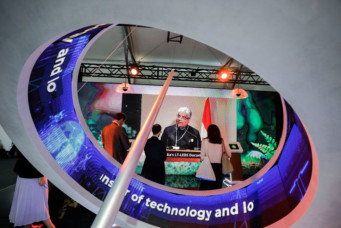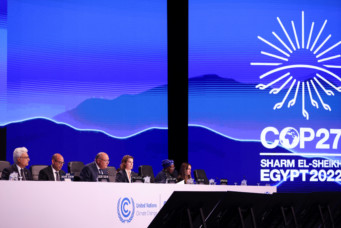Glossary
Adaptation: Adjusting systems to the current or expected effects of climate change
Adaptation gap: The gap between adaptation goals and the actual implementation of adaptation measures, which is often impacted by resource limitations and competing priorities
Carbon sinks: Anything that absorbs carbon-containing chemical compounds from the atmosphere, including the ocean, soil, and forests
Climate change: Long-term changes in temperature and weather patterns; since the 1800s, human activities such as burning fossil fuels have been the main contributors
Climate isolationism: A technocratic approach to climate action that tends to focus on narrow policies with the aim of reducing greenhouse gas emissions and “fixing” the climate
Climate justice: An approach to climate action that focuses on systems and policies that perpetuate the concentration of power and further extractive economic practices; this approach aims to recognize and resist the concentration of power and wealth through climate action
Common But Differentiated Responsibilities and Respective Capabilities (CBDRRC): A principle within the United Nations Framework Convention on Climate Change, which calls for widespread cooperation and acknowledges the differentiated responsibilities and capabilities of countries differing in social and economic conditions; countries within the CBDR-RC category “Annex I” have a greater mitigation responsibility than “non-Annex I” countries
Conference of the Parties (COP): The supreme decision-making body of the United Nations Framework Convention on Climate Change (UNFCCC), which meets every year to make decisions regarding the implementation of the UNFCCC and to review progress; COP27 is the 27th Conference of the Parties, which took place in Sharm El-Sheikh, Egypt in November 2022
Energy democracy: A growing social movement that acknowledges how fossil-fuelbased energy systems and multinational energy companies perpetuate social inequities, vulnerabilities, and disparities; the aim is to use renewable energy transformation as a means of redistributing power to the people
Fossil fuels: Hydrogen-containing fuels that are extracted from the Earth, including coal, oil, and natural gas; burning fossil fuels leads to greenhouse gas emissions that contribute to global warming
Green Jobs: Jobs that are meant to preserve or restore the environment, be they in traditional sectors such as manufacturing and construction, or in new, emerging green sectors such as renewable energy and energy efficiency
Greenhouse gas (GHG): Gasses in the earth’s atmosphere that trap heat, the most common being carbon dioxide; human activities have caused an increase in the release of GHGs, leading to global warming and climate change
Group of Twenty (G20): Intergovernmental forum addressing issues related to the global economy; comprises of nineteen countries and the European Union
Intergovernmental Panel on Climate Change (IPCC): Intergovernmental body of the United Nations established to provide governments with scientific information to be used in the creation of climate policy
Kyoto Protocol: First adopted in 1997 before entering into force in 2005, an agreement that operationalizes the United Nations Framework Convention on Climate Change that legally binds developed countries to reduce greenhouse gas emissions in alignment with agreed individual targets; the protocol includes the principle of “common but differentiated responsibility and respective capabilities,” which places a greater burden of climate mitigation onto developed countries
Loss and damage fund: Established at COP27, a fund designed to provide financial assistance for climate-related loss and damage sustained by countries most vulnerable to climate change
Mitigation: Reducing or preventing the release of greenhouse gas emissions in order to limit climate change
Nationally Determined Contribution (NDC): A non-binding national plan that focuses on a country’s efforts to reduce greenhouse gas emissions and adapt to climate change; the Paris Agreement requires that each party to the convention submit an NDC every five years
Nuclear energy: Energy obtained from nuclear reactions, which can be used to produce electricity
Organization of the Petroleum Exporting Countries (OPEC): An intergovernmental organization of the world’s leading oil-producing countries
Paris Agreement: Legally binding international treaty on climate change adopted at the 21st Conference of the Parties in 2015; the overarching goal is to limit the temperature increase to 1.5 degrees Celsius above pre-industrial levels
Renewable energy: Energy that comes from a source that can be replenished at a higher rate than it is consumed; common sources include the sun and wind
United Nations Framework Convention on Climate Change (UNFCCC): Effective since 1994, a convention that established an intergovernmental treaty to combat human interference in the climate, specifically around greenhouse gas emissions




